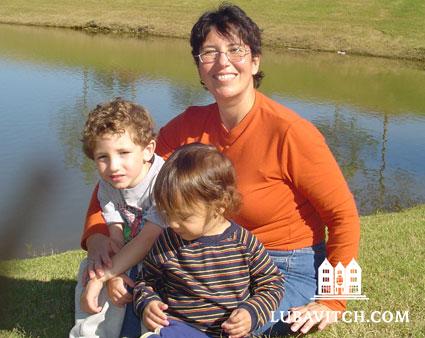Asher Scherer-Smokey will have to wait until nightfall for a birthday cake, but that’s life for a Yom Kippur baby.
His mom, Dr. Beth Scherer-Smokey, a chiropractor in Birmingham, AL, chuckles now as she considers how her son’s birthday parties could fit in with fasting on Yom Kippur. His birth two years ago, though, was no laughing matter.
Twenty-four weeks into her pregnancy, just after hosting a surprise party for Chabad of Alabama’s representative Frumie Posner, Dr. Scherer-Smokey phoned her father and was telling him “the pregnancy was great. My blood pressure was fine."
This was unlike her first pregnancy with son Liam, now 4, when she was hospitalized for pre-eclampsia, a dangerous condition of pregnancy that sends blood pressure to stratospheric levels, and in Dr. Scherer-Smokey’s case led to near liver and kidney failure, an emergency c-section and a preemie weighing 3 pounds.
At 5 a.m., hours after hanging up with her father, Dr. Scherer-Smokey felt her water break, and knew to get to the hospital at once. With her baby in danger and her increased risk of infection, Dr. Scherer submitted to doctor’s orders: hospitalization and bed rest.
Flat on her back for 23 hours of each day except for one hour in a wheelchair, Dr. Scherer-Smokey had a lot of time to reflect but often she worried about her chiropractic practice’s chances of survival. Her parents flew in to care for Liam. Husband Dana Smokey brought books from two favored genres: murder mysteries and Judaism. Frumie Posner and Chabad of Birmingham’s Miriam Friedman visited. Along with good cheer, they brought food. As the hospital dietician had trouble finding kosher hospital fare, home-cooked meals were a special treat.
A month into her hospital stay, Rosh Hashannah came and went. During week five, as Yom Kippur approached Dr. Scherer-Smokey remembered: “I kind of felt guilty because I knew there was no way I was going to be allowed to fast.”
That eating on Yom Kippur and kosher food in the hospital would gnaw her conscience was a turnabout for Dr. Scherer-Smokey. During her childhood in Long Island, NY, she showed up to Hebrew school classes for ten years without absorbing much. She tried another synagogue in Alabama, but “I didn’t feel comfortable.” A patient whose sore hip improved under Dr. Scherer-Smokey’s deft touch mentioned Chabad. “I went to my first service at Chabad. They were immediately friendly.”
As the rabbis sang the first haunting notes of the Kol Nidrei in Chabad of Birmingham’s well appointed, and packed to the gills, sanctuary, Dr. Scherer-Smokey supine in her hospital bed felt a twinge. And then another. A contraction. Labor, just 30 weeks into pregnancy, had begun. The condition of her unborn child still unknown, another c-section, it was decided, would be best for mother and child. Nurses swooped in to remind Dr. Scherer-Smokey that she was not to eat or drink anything, because of the dangers of aspirating food or liquid under anesthesia. “I ended up having to fast that Yom Kippur,” she said.
Yom Kippur liturgy, replete with pleas with for life, for health, for blessings of another year, magnifies just how precarious is the perch is between life and death. But those are words. On the stretcher, as the anesthesiologist approached, “Who shall live? Who shall die?” became more than words for Dr. Scherer-Smokey.
Minutes after the incision was made, a four-pound Asher Scherer-Smokey greeted the world, red and flailing, a good sign for a preemie. At first, a good breather on his own, Asher was whisked into the NICU to warm up and grow. Alarms sounded when his breathing fell below healthy levels, and he was intubated and on a respirator, but just for a day.
Four weeks later, Asher came home and has thrived ever since. Around Thanksgiving, a Chabad mohel Rabbi Eliyahu Shusterman from Atlanta, GA, performed his brit in a quiet ceremony. Asher’s name is a portmanteau of the names of his two maternal great-grandmothers: Anna and Shirley. Asher is also a Hebrew word for “happiness” or “contentment” and Dr. Scherer-Smokey said, “He lives up to his name. He rarely cries.”
Yom Kippur is somber, a reflection, but it can be viewed – especially through the lens of Chabad philosophy as a time of profound joy at the revelation of the permanent connection between our selves and our Creator. For Dr. Scherer-Smokey, the joy of Yom Kippur is obvious. “When I go into Yom Kippur, it is a feeling of blessing, a time to look forward to the next year. Since Asher’s birth, I always felt the coming year will be better than the one before.”

Be the first to write a comment.